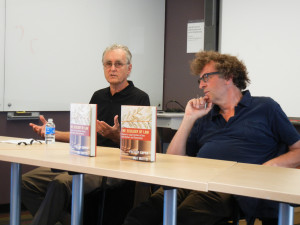
Physicist Fritjof Capra and legal scholar Ugo Mattei discussed the limitations of modern legal systems in dealing with pressing environmental crises at a panel last Friday, highlighting the urgency of establishing radically new legal frameworks to protect our earth.
Capra, the director of the Center for Ecoliteracy at UC Berkeley, and Mattei, a professor at Hastings College of the Law, elaborated on their new book, “The Ecology of Law: Toward a Legal System in Tune with Nature and Community.”
The panelists discussed their views on the problems of using the law to combat climate change, water shortages and overdevelopment of land resources, and offered ideas for a legal system that takes these ecological considerations into account.
Capra’s realization that “the term ‘law’ is used both in science and in jurisprudence” led him to collaborate with Mattei on exploring the history of interactions between science and law.
In his research, Capra found that the scientific revolution of the 1600s was reflected by a legal revolution at around the same time.
The underlying goal of the law, however, remained the same to this day: Laws exist to support industry by converting common resources, or commons, to economic capital, allowing mostly unchecked use of natural resources.
But today we can no longer afford such unchecked use of resources, said Capra.
Mattei cited our current ecological footprint of 1.4, which indicates that 40 percent of the resources we consume cannot be replenished by nature and is lost permanently. In addition, he pointed out that “global inequality is structured into this very simple data,” as countries in the Global South often leave negligible footprints compared to major economies like the United States and Europe.
“The only way in which it is possible to keep living…as we do in the West is that the rest [of the world] is suffering,” Mattei said.
In response to the resource crisis, Mattei proposed the introduction of a new legal framework that views law as a public resource in making important social decisions, along with institutions that aim to replenish nature by turning capital back into resources.
“We have to see the law outside of a hyper-professionalized legal style by which, today, human laws are the province of law schools, of legal professionals, of attorneys with their briefcases filing their cases in court, without any sort of real relationship with social conditions,” Mattei said.
Mattei concluded by bringing up the example of the civil rights protests and civil disobedience as a possible path forward for such change.
“We look at the law from the point of view of those that are actually breaking it for the purpose of constructing institutions that finally are able to give back some of the capital to the commons, to take our direction as a society in a direction that is sustainable for everybody, and which will allow us to leave the planet to the generation of which many of you are here,” said Mattei.
Contact Albert Zhang at albertzh ‘at’ stanford.edu.